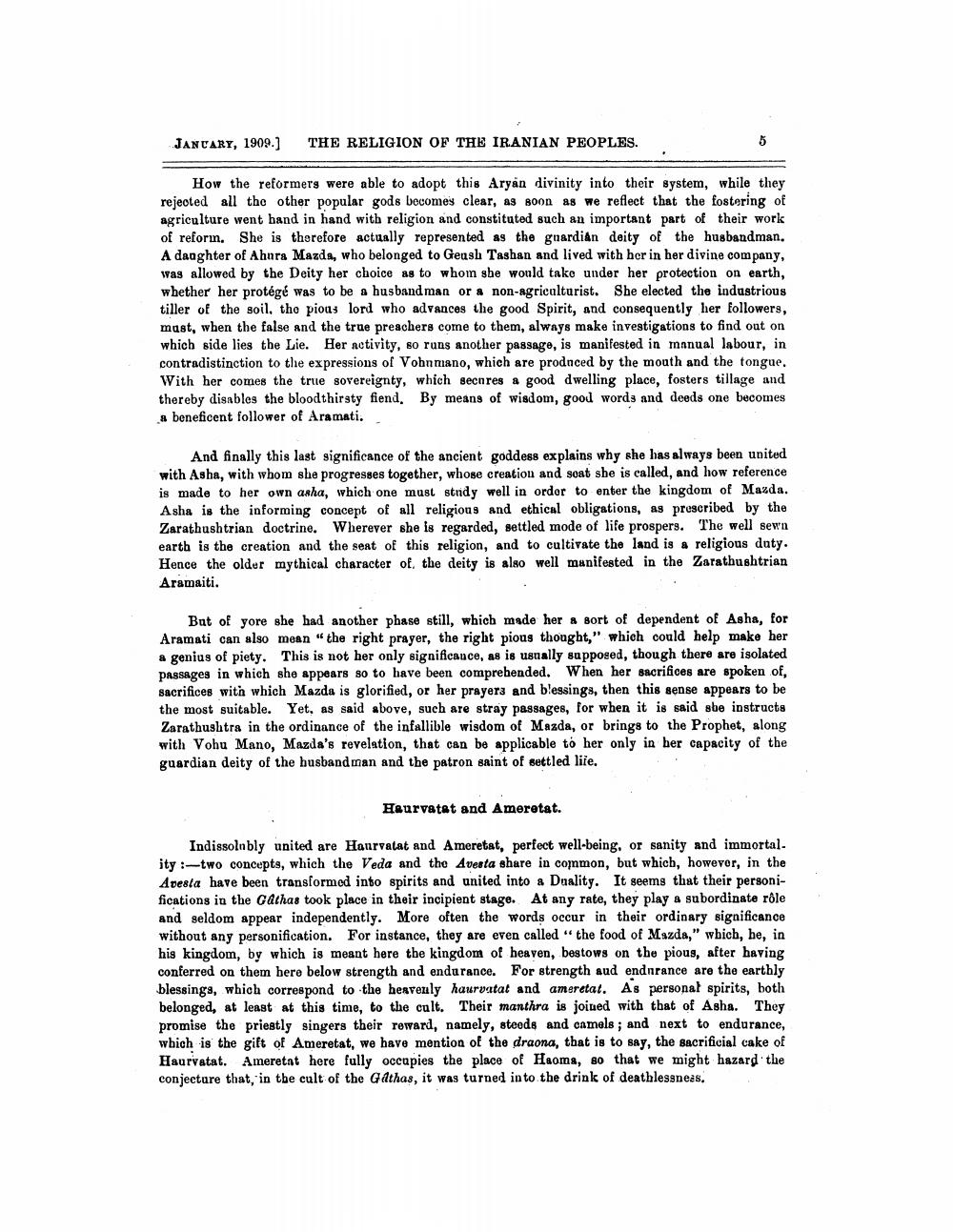Book Title: Indian Antiquary Vol 38 Author(s): Richard Carnac Temple Publisher: Swati Publications View full book textPage 9
________________ JANUARY, 1909.) THE RELIGION OF THE IRANIAN PEOPLES. How the reformers were able to adopt this Aryan divinity into their system, while they rejected all the other popular gods becomes clear, as soon as we reflect that the fostering of agriculture went band in hand with religion and constituted such an important part of their work of reform. She is therefore actually represented as the guardián deity of the husbandman. A daaghter of Ahura Mazda, who belonged to Geash Tashan and lived with her in her divine company, was allowed by the Deity her choice as to whom she would take under her protection on earth, whether her protégé was to be a husband man or a non-agricolturist. She elected the industrious tiller of the soil, the pious lord who advances the good Spirit, and consequently her followers, must, when the false and the true preachers come to them, always make investigations to find out on which side lies the Lie. Her activity, so runs another passage, is manifested in manual labour, in contradistinction to the expressions of Vobnmano, which are produced by the mouth and the tongue. With her comes the true sovereignty, which secures a good dwelling place, fosters tillage and thereby disables the bloodthirsty fiend. By means of wisdom, good words and deeds one becomes a beneficent follower of Aramati. And finally this last significance of the ancient goddess explains why she has always been united with Asha, with whom she progresses together, whose creation and soat she is called, and how reference is made to her own asha, which one must stridy well in order to enter the kingdom of Mazda. Asha is the informing concept of all religious and ethical obligations, as prescribed by the Zarathushtrian doctrine. Wherever she is regarded, settled mode of life prospers. The well sewn earth is the creation and the seat of this religion, and to cultivate the land is a religious duty. Hence the older mythical character of the deity is also well manifested in the Zarathushtrian Aramaiti. Bat of yore she had another phase still, which made her a sort of dependent of Asha, for Aramati can also mean "the right prayer, the right pious thought," which could help make her a genius of piety. This is not her only significance, as is usually supposed, though there are isolated Passages in which she appears so to have been comprehended. When her sacrifices are spoken of, sacrifices with which Mazda is glorified, or her prayers and blessings, then this sense appears to be the most suitable. Yet, as said above, such are stray passages, for when it is said sbe instructs Zarathushtra in the ordinance of the infallible wisdom of Mazda, or brings to the Prophet, along with Vohu Mano, Mazda's revelation, that can be applicable to her only in her capacity of the guardian deity of the husband man and the patron saint of settled life. Heurvatat and Ameretat. Indissolubly united are Haurvatat and Ameretat, perfect well-being, or sanity and immortal. ity :-two concepts, which the Veda and the Avesta share in common, but which, however, in the Apesta have been transformed into spirits and united into a Duality. It seems that their personifications in the Gathas took place in their incipient stage. At any rate, they play a subordinate rôle and seldom appear independently. More often the words occur in their ordinary significance without any personification. For instance, they are even called the food of Mazda," which, he, in his kingdom, by which is meant here the kingdom of heaven, bestows on the pious, after having conferred on them bere below strength and endurance. For strength aud endnrance are the earthly blessings, which correspond to the heavenly haurvatat and ameretat. As personal spirits, both belonged, at least at this time, to the cult. Their manthra is joined with that of Asha. They promise the priestly singers their reward, namely, steeds and camels; and next to endurance, which is the gift of Ameretat, we have mention of the draona, that is to say, the sacrificial cake of Haurvatat. Ameretnt here fully occupies the place of Haoma, so that we might hazard the conjecture that, in the cult of the Gathas, it was turned into the drink of deathlessness.Page Navigation
1 ... 7 8 9 10 11 12 13 14 15 16 17 18 19 20 21 22 23 24 25 26 27 28 29 30 31 32 33 34 35 36 37 38 39 40 41 42 43 44 45 46 47 48 49 50 51 52 53 54 55 56 57 58 59 60 61 62 63 64 65 66 67 68 69 70 71 72 73 74 75 76 77 78 79 80 81 82 83 84 85 86 87 88 89 90 91 92 ... 362
